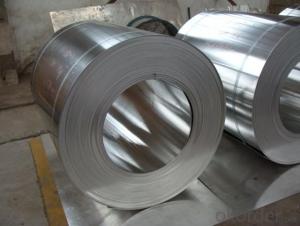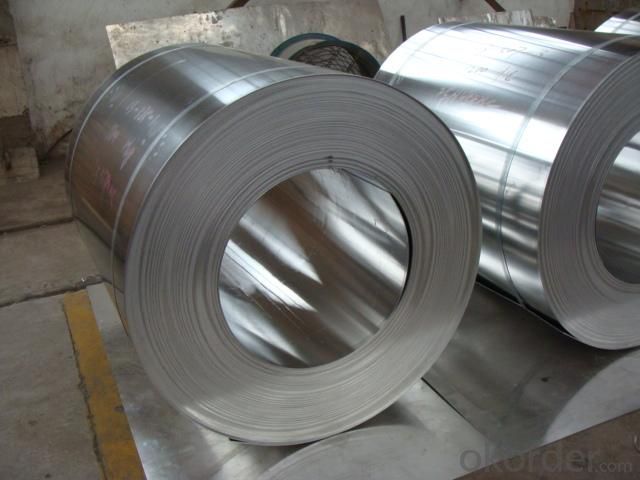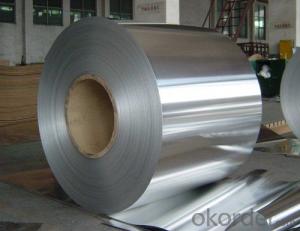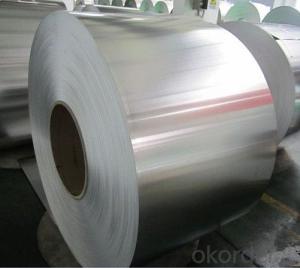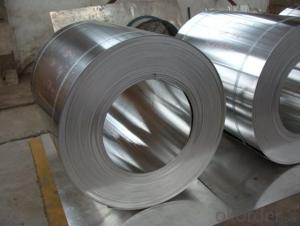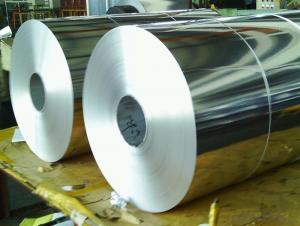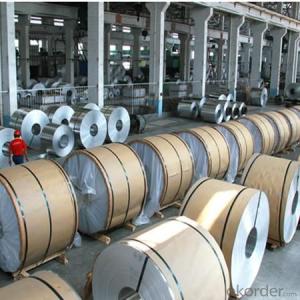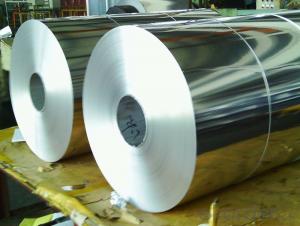Gentek Aluminum Coil 5052 Temper HO 0.4mm 0.5mm 0.6mm Thick Aluminum Roll
- Loading Port:
- Shanghai
- Payment Terms:
- TT OR LC
- Min Order Qty:
- 5 m.t.
- Supply Capability:
- 6000 m.t./month
OKorder Service Pledge
OKorder Financial Service
You Might Also Like
Specification
5052 Temper Ho 0.4mm 0.5mm 0.6mm Thick Aluminum Roll
Applications:
Aluminum foil roll is widely used in construction,decoration,hardware,
electric appliances,machinery and other industrial and civil purposes,
such as electronic capacitor,composite cooker,rice cooker,refrigerator,
computer casting,telecommunication,equipment,lamp shade,air conditioner,
cosmetics cover and so on.
Or it can be made as customers’ requirement.
Specifications
color aluminum coil
1000 series 1100 10160 1200
surface could be: Brushed, drawing, embossed, printing
color: red,
color aluminum coil
.Alloy type: 1050/1060/1100/1350
2.Temper: H16, H18, H22, H24
3.Thickness range: 0.1mm-4mm
4.Width range: 25mm-1600mm
5.Surface:finish: bright & smooth surface, without flow lines, slight oiled to avoid white rusting.
6.Quality material:totally free from such defefects as roll marks, edge damager, camber, white rust, oil patches, holes, break lines,
color aluminum coil
Name |
color aluminum coil |
Alloy or not | yes |
Alloy | 1100H16/18, 3003H24,3003H26,3005H26,8011,3004,3105,5005,etc. |
Thickness | 0.1-4mm |
Width | ≤1600mm |
MOQ | 5T |
Coating finish | Brushed, drawing, embossed, printing |
Color | As to code RAL |
Surface | Embossed,Mill Finish,Coated,Brushed |
Gloss | 10-90%(EN ISO-2813:1994) |
Total coating thick | PVDF27 ~35micron |
Polyester18~27micron(EN ISO-2360:1995) | |
Coating hardness | 2H |
Adhesion | 5B (EN ISO-2409:1994) |
Impact resistance | No cracking and peeling (A.S.T.M D2794-1993) |
Flexibility (T-bend) | 0T- 2T |
MEK resistance | 100 |
Certification | ISO9001:2000, CE, SGS |
Coil's standard diameter | 1100mm |
Inner Diameter | 405mm/505mm |
Coil's standard weight | 2000kgs |
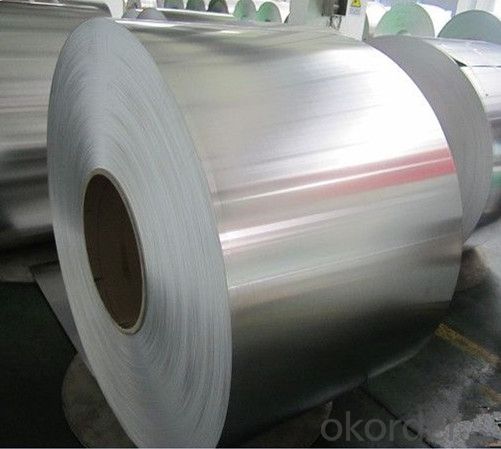
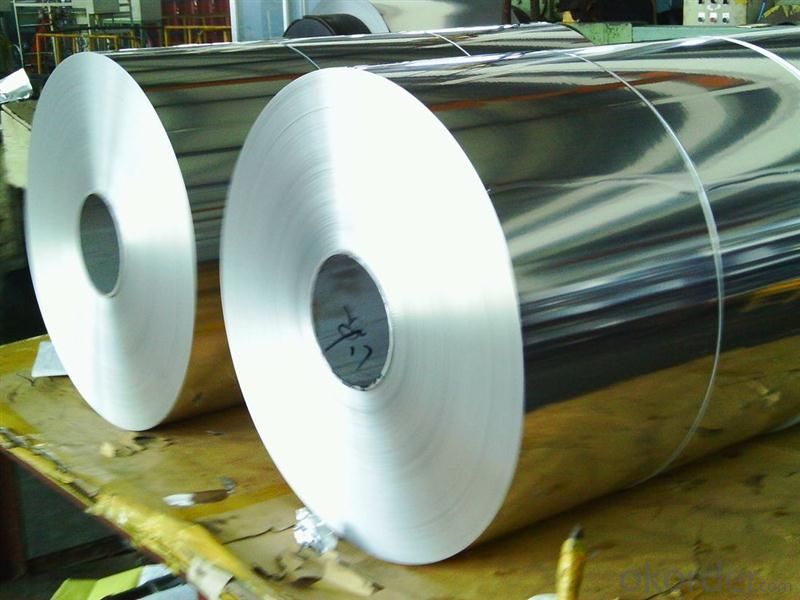
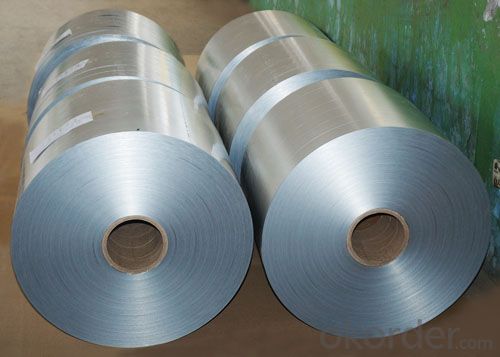
- Q: Can aluminum coils be used for heat transfer applications?
- Yes, aluminum coils can be used for heat transfer applications. Aluminum is known for its excellent thermal conductivity, which means it is highly effective in transferring heat. Aluminum coils are commonly used in various heat transfer applications such as air conditioning systems, refrigeration units, and heat exchangers. The lightweight and corrosion-resistant properties of aluminum also make it a popular choice for these applications. Additionally, aluminum coils can be easily shaped and formed, allowing for efficient heat transfer in complex systems.
- Q: Can aluminum coils be used in marine environments?
- Yes, aluminum coils can be used in marine environments. Aluminum is widely used in marine applications due to its excellent corrosion resistance properties. It forms a protective oxide layer that prevents further oxidation and corrosion, making it suitable for various marine equipment and structures.
- Q: What is the typical elongation of aluminum coils?
- The elongation of aluminum coils can vary depending on various factors, including the specific alloy and temper of the aluminum, the manufacturing process, and the intended application. However, aluminum coils generally have a high capacity for elongation. On an average basis, aluminum coils can stretch or deform by approximately 5-15% without fracturing or breaking. This is possible due to the inherent ductility of aluminum, which enables it to be easily shaped and formed without compromising its structural integrity. The elongation of aluminum coils plays a significant role in multiple industries, such as construction, automotive, and aerospace, where the material is commonly utilized. This characteristic allows for efficient fabrication procedures, including bending, rolling, and stamping, to create intricate and precise shapes. It is important to highlight that the elongation of aluminum coils can be further enhanced through the incorporation of specific alloying elements and heat treatments. These processes can improve the material's properties, making it even more suitable for demanding applications that require exceptional strength, ductility, and elongation capabilities. To accurately determine the elongation properties for a specific application, it is crucial to consider the particular alloy, temper, and manufacturing processes involved. In conclusion, while the typical elongation of aluminum coils ranges from 5-15%, a comprehensive evaluation of these factors is necessary.
- Q: What are the potential dangers associated with the use of aluminum coil?
- <p>Aluminum coil, when used in appropriate applications and handled correctly, is generally safe. However, there are some safety risks to consider: exposure to aluminum dust can cause respiratory issues, and improper handling can lead to cuts or burns. Additionally, aluminum can react with certain chemicals, potentially causing hazardous situations. It's important to use personal protective equipment and follow safety guidelines when working with aluminum coil to minimize these risks.</p>
- Q: And what are the advantages/disadvantages of steel aluminum in building cars?Which would be better for building cars?
- Erm im no expert, bt I dont think aluminum is very strong, thus not very safe for a car!
- Q: Are aluminum coils compatible with other building materials?
- Generally, other building materials are compatible with aluminum coils. Aluminum, a versatile material, finds applications in various construction projects. It is frequently employed for roofing, cladding, gutters, and other external components of buildings. The lightweight property and corrosion resistance of aluminum enable its seamless integration with materials like wood, concrete, glass, and steel. Furthermore, aluminum coils can be effortlessly molded and shaped to meet specific design specifications, ensuring smooth compatibility with diverse building materials.
- Q: Can aluminum coils be used in aerospace applications?
- Yes, aluminum coils can be used in aerospace applications. Aluminum is a lightweight and durable material that offers excellent heat conductivity and corrosion resistance, making it suitable for various aerospace components like heat exchangers, condensers, and cooling systems. Its versatility and strength-to-weight ratio make aluminum coils a popular choice in the aerospace industry.
- Q: This question asks for a brief explanation of the process involved in manufacturing aluminum coils.
- <p>To make aluminum coil, start with high-quality aluminum ingots. These are melted in a furnace and then poured into a casting machine to create a continuous cast strip. This strip is passed through a series of rollers to reduce its thickness and achieve the desired width and thickness. The rollers apply heat and pressure, gradually forming the aluminum into a coil. The coil is then cooled, often using water, and wound onto a mandrel for storage or further processing. Quality control checks are performed throughout the process to ensure the coil meets specific strength, thickness, and surface finish requirements. The final product is a tightly wound aluminum coil ready for use in various industries such as construction, automotive, and packaging.</p>
- Q: How are aluminum coils manufactured?
- Aluminum coils are manufactured through a process known as aluminum coil rolling. This process involves several steps that transform aluminum ingots into coils of various sizes and thicknesses. The first step in manufacturing aluminum coils is aluminum smelting, where raw aluminum ore is extracted and refined into aluminum ingots. These ingots are then heated in a furnace to a specific temperature, where they become malleable and ready for the rolling process. The second step is hot rolling, where the heated aluminum ingots are passed through a series of rolling mills. These mills apply pressure to the ingots, gradually reducing their thickness and increasing their length. The aluminum ingots are rolled back and forth between multiple rollers to achieve the desired thickness and shape. This process also helps to improve the mechanical properties and surface finish of the aluminum. After hot rolling, the aluminum coils undergo a process called cold rolling. In this step, the coils are further reduced in thickness using a series of cold rolling mills. Cold rolling improves the dimensional accuracy, surface finish, and mechanical properties of the aluminum. It also helps to enhance the strength and hardness of the material. Once the desired thickness is achieved, the aluminum coils may undergo additional processes such as annealing or tempering. Annealing involves heating the coils and then slowly cooling them to relieve internal stresses and improve their ductility. Tempering, on the other hand, involves reheating the coils to a specific temperature and then rapidly cooling them to enhance their strength and hardness. After these processes, the aluminum coils are usually inspected for quality control purposes. They are checked for any defects, such as surface imperfections or thickness variations, and any necessary corrections are made. Finally, the aluminum coils are typically cut into smaller sizes and packaged for distribution to various industries that use them for different applications, such as in the manufacturing of automobiles, appliances, construction materials, and packaging. In conclusion, the manufacturing of aluminum coils involves processes such as smelting, hot rolling, cold rolling, annealing, tempering, and quality control checks. These steps ensure that the aluminum coils meet the required specifications in terms of thickness, strength, and surface finish.
- Q: Is it possible to use aluminum coils in the creation of toys or games for children?
- <p>Yes, aluminum coils can be used to make toys or games for children, but safety considerations must be taken into account. Aluminum is a lightweight, durable, and non-toxic material, making it suitable for various applications, including children's toys. However, it's crucial to ensure that any aluminum used in toys is properly treated to prevent sharp edges or small parts that could pose a choking hazard. Additionally, the toys or games should be designed and manufactured to meet safety standards and regulations to protect children from potential harm.</p>
Send your message to us
Gentek Aluminum Coil 5052 Temper HO 0.4mm 0.5mm 0.6mm Thick Aluminum Roll
- Loading Port:
- Shanghai
- Payment Terms:
- TT OR LC
- Min Order Qty:
- 5 m.t.
- Supply Capability:
- 6000 m.t./month
OKorder Service Pledge
OKorder Financial Service
Similar products
Hot products
Hot Searches
Related keywords
